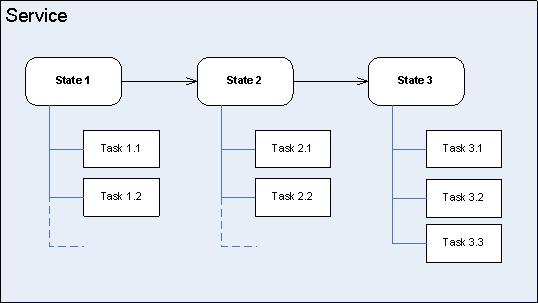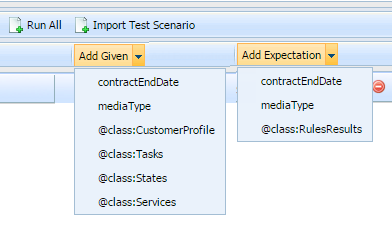Contents
Working with Test Scenarios
In the initial 8.5.001 release of GRS, the Test Scenario feature did not support rules that were created using the Conversation Manager (CM) template. This is because the Test Scenario feature in release 8.5.001 works by taking the input data (a set of one or more facts with different fields) that is configured by the user and building the appropriate Fact model, then running the rules under GRAT using that set of data. In release 8.5.1, the Test Scenario feature now supports rules based on the CM template.
Data Structure in CM
With Conversation Manager, the data is in a hierarchical JSON format of Customer -> Service -> State -> Task. Any given Customer may have one or more Services. Each Service may be in at most one State at a time. Each State may have one or more Tasks. Tasks may also be associated directly with Services.
So the Customer, Services, States and Tasks Facts have now been added the lists of Facts that can be defined as Given fields, and the RulesResults Fact has been added to the list of Facts that can be defined as an Expectation.
Each of the new values is represented by a JSON string which will be the value for that field.
Now, when the type of rule for which you want to create a test scenario is a Conversation Manager rule (based on the Conversation Manager template), a series of different values for the Given and Expectation elements that reflect these more complex data structures are available. In the example below you can see the Customer > Service > State > Task structure is reflected by the four @class entries in the drop-down list of Givens and the @class:RulesResults entry in the drop-down list of Expectations.
When you select an @class entry, a new column is added. Click on a grid cell under the new column to bring up the edit dialog for that entry. The additional data listed below can be selected as either a Given or an Expectation.
Additional CM Template Objects
Givens
The list below shows the additional provided data.
- Available by selecting one of the @class entries:
- Add Customer Attribute
- Add Service
- Add Service Type
- Add Service Start Time
- Add Service Completion Time
- Add State
- Add State Type
- Add State Start Time
- Add State Completion Time
- Add Task
- Add Task Type
- Add Task Start Time
- Add Task Completion Time
- Available for direct selection from Givens:
- Add Interaction Media Type
- Add Contract End Date
Expectations
The list below shows the additional expected results:
- Update Customer Attribute
- Request Specific Agent
- Request Agent Group
- Request Place Group
- Request Skill
- Send Communication to Customer
- Block Communication to Customer
- Offer Service Resumption
- Offer Survey to Customer
Edit Dialogs
To create entries for the Givens and Expectations of your Conversation Manager test scenario, select the relevant @class item and use the sample additional edit dialogs shown below.







